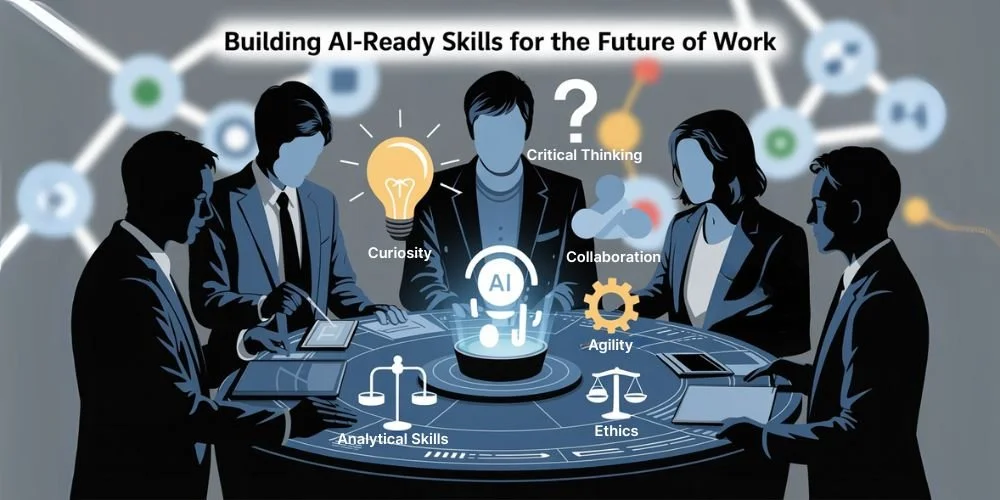Building AI-Ready Skills for the Future of Work
I often get asked by leaders, “Where do I even begin when it comes to AI?” And the answer I always come back to is: start with skills. In Episode 72 of Talent Talk, I sat down with Armanda Mealha, Executive Director at Microsoft Portugal, to talk about what it actually means to be AI-ready. This wasn’t just about tech literacy—it was about developing the mindset and behaviors that let leaders and teams thrive in an ever-evolving world.
🎧 Listen to the full episode on Spotify:Talent Talk – Episode 72
Why AI-Ready Skills Matter
The AI conversation can feel overwhelming, but here's what I’ve seen: being AI-ready doesn’t mean you’re a data scientist. It means you’re willing to explore, question, and evolve.
Armanda put it beautifully:
"We need to move fast, but not lose our values along the way."
And I couldn’t agree more. In my coaching work, the leaders and teams who succeed aren’t the ones who know the most tech—they’re the ones who are open to learning and experimenting.
Five Core Skills That Matter Most
Based on my conversation with Armanda (and what I see in the field every day), these are the skill areas I encourage leaders to develop in themselves and their teams:
1. Digital Curiosity
Play. Test. Ask questions. At Microsoft, Armanda’s teams block out time weekly to explore tools like ChatGPT and Copilot. I do the same with clients—because confidence grows through hands-on use.
2. Critical Thinking
When AI gives you an answer, do you pause and ask, “Is this right? Is it useful? Does it reflect our values?” That pause is a skill, and it’s essential.
3. Collaboration with Tech
The leaders I coach who thrive with AI use it as a partner. One team I worked with used Copilot to speed up reporting, which freed them to focus on building strong client relationships. That’s the win.
4. Change Agility
Change is constant. Teams that pivot fast, reflect often, and stay open outperform the ones that cling to “how we’ve always done it.”
5. Ethical Awareness
You don’t need to be in compliance to ask, “Is this right?” Every team member plays a role in making sure AI is used responsibly.
How to Start Building These Skills
If you're wondering how to build AI-ready skills practically, here are a few things I’ve seen work well:
Host hands-on demos: Create low-pressure team sessions to test tools together.
Offer learning paths: Give access to courses and internal resources on topics like prompt writing, data literacy, or AI bias.
Pair departments: Bring people together across silos to co-learn and experiment.
Launch micro-projects: Try small AI experiments to build confidence and momentum.
Celebrate attempts: Don’t wait for polished results—recognize people for giving it a go.
Armanda shared how even small-scale exploration built trust and comfort across her teams. I see the same with my clients.
Real Examples to Learn From
Here are a few stories from the episode—and from my coaching work—that show AI skill-building in action:
Sales: Teams used Copilot to draft emails and proposals, cutting writing time in half.
Customer Service: Staff practiced with chat automation tools to support faster, smarter interactions.
Education: Teachers worked with students to co-write with AI, and then discuss bias and ethics together.
These aren’t flashy projects—they’re real, useful, and rooted in learning.
Watch Out for These Pitfalls
Let’s talk honestly about what holds teams back:
Perfectionism: You don’t need to be an expert to get started. Start messy.
Only training the “tech” people: Everyone uses tech. Everyone needs support.
Skipping the ethics: This is what separates good AI use from great, sustainable practice.
AI isn’t just a systems upgrade—it’s a mindset upgrade. And that has to be intentional.
Personal Growth Starts With You
If you’re in a leadership role, your team is watching how you engage with change. I always say: model what you want to see.
Share your own learning.
Talk openly about what you’re exploring.
Reflect on what you’re learning—and what still confuses you.
That vulnerability creates psychological safety. That’s where real growth happens.
Final Thoughts
If you’re feeling behind on AI—don’t. No one has it all figured out. The most future-ready leaders I know are the ones learning alongside their teams.
So here’s your challenge: pick one new tool this week. Try it. Reflect. And talk about it. That’s how change starts.
Let’s Keep the Conversation Going
This post is part of a 5-part blog series based on my conversation with Armanda Mealha on Talent Talk. Catch the full episode here on Spotify.
📣 If you're looking for support building AI-ready skills and mindsets across your leadership team, I’d love to help. VisitThe Career Establishment to explore coaching, facilitation, and team development programs.

